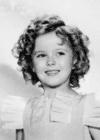- Temple, Shirley
-
U.S. child actress.She was selected from her dancing class for a screen test and made her debut at age four. She won notice in Stand Up and Cheer (1934) and was featured in Little Miss Marker (1934) and Bright Eyes (1934), in which she sang "On the Good Ship Lollipop." A precocious performer known for her dimples and golden curls, she became the country's most popular female star and Hollywood's top box office attraction in the Great Depression era. She received a special Academy Award in 1934. Her later films include The Little Colonel (1935), Wee Willie Winkie (1937), and The Little Princess (1939). As an adult she served as a U.S. delegate to the UN General Assembly (1969–70) and as U.S. ambassador to Ghana (1974–76) and Czechoslovakia (1989–92).
 Shirley Temple.Brown Brothers
Shirley Temple.Brown Brothers* * *
▪ United States diplomat and actressborn April 23, 1928, Santa Monica, Calif., U.S.internationally popular American child star of the 1930s, who was Hollywood's greatest box-office attraction at the age of seven in sentimental musicals.At age three Temple was picked from her dancing class to appear in Baby Burlesks, a series of one-reel comedies. In 1934 she gained recognition in her first feature film, the musical Stand Up and Cheer, and later that year appeared in a succession of movies, including Little Miss Marker, Change of Heart, Now I'll Tell, Now and Forever, and Bright Eyes (in which she sang one of her most popular songs, "On the Good Ship Lollipop" ). By the end of 1934 she was one of Hollywood's top stars, and the following year she received a special Academy Award as “the outstanding personality of 1934.” She was Hollywood's top box office attraction from 1935 to 1938 with such hits as The Little Colonel (1935), Curly Top (1935), Wee Willie Winkie (1937), Heidi (1937), and Rebecca of Sunnybrook Farm (1938). Her spirited singing and dancing, her dimples and blond ringlets, and the simple optimistic sentiments of the films in which she appeared proved enormously appealing, particularly in contrast with the era of the Great Depression that was her heyday.In the 1940s, however, Temple's popularity declined, and subsequent movies were largely unsuccessful. In 1950 she retired from the movies and married Charles A. Black. She later made a brief return to entertainment with a popular television show, Shirley Temple's Storybook, in 1957–59 and the less successful Shirley Temple Show in 1960. As Shirley Temple Black she became active in civic affairs and Republican politics. In 1967 she ran unsuccessfully for the office of U.S. representative to Congress from California. From 1969 to 1970 she was a delegate to the UN General Assembly. Diagnosed with breast cancer in 1972, Black was one of the first celebrities to go public about having the illness. She then served as U.S. ambassador to Ghana (1974–76), chief of protocol for President Gerald R. Ford (1976–77), and member of the U.S. Delegation on African Refugee Problems in 1981. From 1989 to 1992 she served as ambassador to Czechoslovakia. Her autobiographies include My Young Life (1945) and Child Star (1988).At the beginning of the 21st century, Black remained active in international affairs, serving on the board of directors of the Association for Diplomatic Studies and the National Committee on U.S.-China Relations, among other organizations. In recognition of her acting career and public service, the Screen Actors Guild presented Black with a life achievement award in 2005.Additional Reading* * *
Universalium. 2010.
